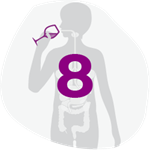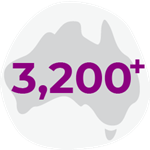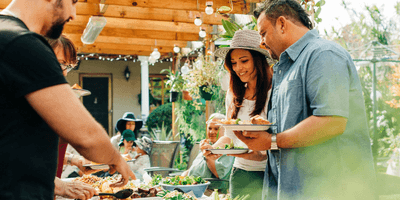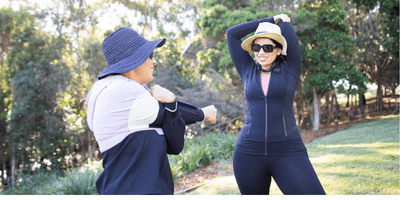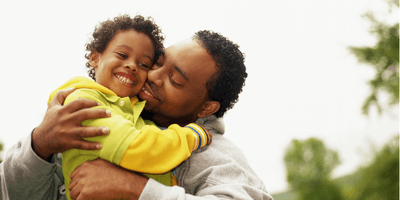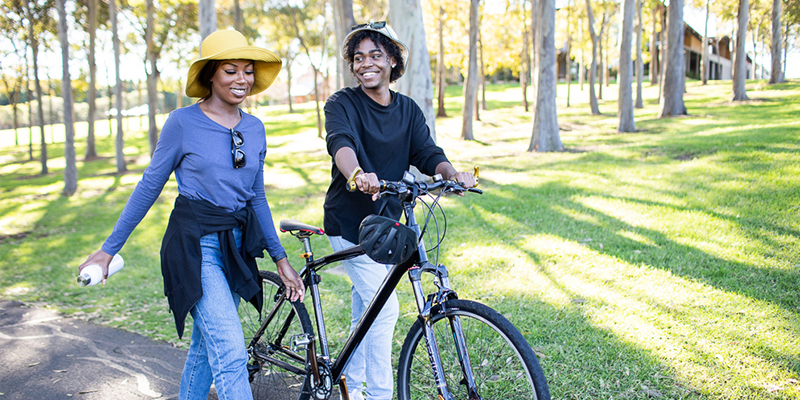Drink less alcohol
You can reduce your cancer risk if you drink less alcohol. Drinking no alcohol at all is even safer.
Why? Every drink increases your risk of getting an alcohol-related cancer. In fact, we know that alcohol causes more than 3,200 cancer cases in Australia each year.1 The bottom line is: there is no level of drinking that is completely safe.
Jump to information about:
Get the facts
Alcohol is linked to eight different types of cancer2
Over 3,200 cancer cases each year in Australia could be prevented if people limited their alcohol consumption1
Even small amounts of alcohol increase your cancer risk3
How does drinking alcohol cause cancer?
There may be several ways that alcohol causes cancer. What we do know is that alcohol contains ethanol, which is a cancer-causing compound (a Group 1 carcinogen). When being broken down by the body, ethanol becomes a toxic chemical called acetaldehyde, which can damage the DNA of your cells causing cancer.
It does not matter the amount nor the type of alcohol you consume, your risk of getting cancer increases with every drink.4
Watch our video about alcohol and 8 different types of cancer it can cause.
Reduce your risk of eight types of cancer
Alcohol is proven to cause cancer. The important factor is the amount of alcohol consumed. Even drinking small amounts of alcohol raises your risk. By drinking less alcohol, you reduce your risk of eight different types of cancer,2 including:
Our recommendation
For cancer prevention, we recommend not drinking alcohol. If you choose to drink, the less you drink, the better.
See the Australian alcohol guidelines, plus read on for tips to cut back on alcohol and create a healthier life.
Practical tips to lower your cancer risk from alcohol
Alcohol can be hard to give up, but any reduction – no matter how small or large – can reduce your risk of cancer and improve the quality of your health. Here are some practical ways you can start cutting down and taking steps towards a healthier future.
Do not hesitate to seek help from health professionals to reduce your drinking. Go to the Alcohol & Drug Information Service (ADIS) website or call their 24 hour support line on 1800 250 015.
Tips to lower your cancer risk
If you want to slowly reduce your alcohol consumption, there are some simple steps that can help. One of the best strategies is to set yourself a drink limit: every time you get a drink, take a note of what number drink it is.
A good guide for setting your drink limit is to follow the National Health and Medical Research Council (NHMRC) Australian guidelines to reduce health risks from drinking alcohol.
For adults, set yourself a limit of no more than ten standard drinks over a week and no more than four on any day.
Anyone under 18 years of age along with women who are pregnant, breastfeeding or planning a pregnancy, should not drink at all.
Unsure of what is a standard drink?
Learn how many standard drinks are in a common glass and keep track of your drinking.
There are many health benefits to creating the habit of having a few alcohol-free days each week. Not only will you lower your cancer risk, you will also see immediate physical and mental benefits including better sleep, increased energy, and a balanced mood. Plus don't forget the cost savings!
Instead of alcohol, try reaching for a low or no alcohol alternative. Many low or no alcohol drinks look and taste the same or similar as your favourite drink.
Some popular alternatives include:
- soda water, which can be flavoured with citrus or a splash of juice
- non-alcoholic spirits – many are infused with botanicals or spice flavours
- low or no alcohol beer or cider or wine
- mocktails instead of cocktails
- kombucha
- sparkling juice
Looking for mocktail ideas?
Check out these creative mocktail recipes for a range of delicious alcohol-free alternatives to suit every taste.
Giving up or changing a drinking habit can be extremely challenging. This is made only harder when alcohol is at the heart of so many social events, making it difficult to say no to a drink. In the first few weeks of trying to reduce how much you drink, it can help to avoid events where there is drinking.
Try to see your friends during the day rather than the evening. Have a picnic in the park with family rather than meeting where there are alcoholic drinks available. Swap after-work drinks at a pub for coffee at a café before work. Or meet up with a friend for a walk or a swim instead of heading out to a bar. For more ideas on social activities that don't involve drinking, take a look at these suggestions from Hello Sunday Morning.
Want to know whether your drinking habits are putting you at risk?
Find out how by using the Alcohol Risk Assessment Tool by Your Room.
It is easy to be encouraged or to feel pressured into drinking, even when we tell our friends and family that we are drinking less for our health. Research shows peers can influence our drinking practices both directly and indirectly.5 Direct influences can be as clear as open encouragement to drink, buying someone a drink when they have said they do not want one, or subtle gestures to drink up. It is helpful to be aware of social pressure and to plan how you are going to respond.
Avoiding the pressure to drink can be as simple as planning an early start the next morning or heading home early. Remind yourself of the reasons you are cutting down or stopping drinking. A solid resolution to change your drinking can be a great aid in resisting the pressure to drink.
Setting up a personal support network or finding no drinking “buddies” can be extremely helpful to start and sustain a goal of reducing your alcohol intake. Telling people about your plans to stop drinking and being a part of a community with a shared goal can help you be accountable. Your support network does not have to be made up of just friends or family, it could be an online community.
Find it hard to talk to friends and family about cutting back on alcohol?
Joining an organised community, like Hello Sunday Morning, can be a good start to get the support you need.
What happens when you stop drinking alcohol?
Reducing your alcohol limit can help prevent cancer, but there are so many other benefits to stopping drinking. Quitting or reducing alcohol for as little as one month can improve your physical wellbeing, mental health and mood, productivity and focus, stability of relationships and money left in your pocket.6 Longer term change brings even greater benefits.
Important note: For some people, suddenly stopping drinking can make them feel physically and emotionally unwell. If you feel sick, sweaty or cannot sleep when trying to cut down on your drinking – you may be experiencing withdrawal symptoms and should see your doctor. If in doubt don’t stop drinking but seek medical advice
Get more info
- Your Room is a great place to get facts about alcohol, how it affects your body and more.
- Get Healthy NSW offers support for drinking less alcohol. It also has a free Alcohol Reduction Program.
- The State Library’s Drug info website has excellent information about alcohol.
- Download the free Daybreak app to help change your relationship with alcohol with both professional and community support. Some people find not drinking alcohol for a month, such as Dry July, is useful for helping to make long term drinking changes.
- Contact the Alcohol & Drug Information Service (ADIS) 24 hour support line 1800 250 015 if you are having issues with alcohol or other drugs, are concerned about someone else’s alcohol or other drug use, or just have general questions. Web chat is also available.
- The Staying well and preventing cancer flipchart was developed for community educators supporting multicultural communities. It starts the conversation around cancer prevention and healthy living behaviours including drinking less alcohol.
- Read the Cancer Institute NSW evidence brief: Alcohol and cancer for a summary of available evidence and our approach to alcohol and cancer prevention
- Check out strategies for the LGBTQ+ community and anyone looking for tips to reduce your drinking.
1. Cancers in Australia in 2010 attributable to the consumption of alcohol," Aust N Z J Public Health 2015. Available from http://www.ncbi.nlm.nih.gov/pubmed/26437723
2. International Agency for Research on Cancer. Personal Habits and Indoor Combustions. Volume 100E. IARC Monographs on the Evaluation of Carcinogenic Risks to Humans. Lyon: IARC, 2012.
3. World Cancer Research Fund / American Institute for Cancer Research. Food, Nutrition, Physical Activity, and the Prevention of Cancer: a Global Perspective. Washington, DC: AICR, 2007.
4. Schutze M, Boeing H, Pischon T, et al. Alcohol attributable burden of incidence of cancer in eight European countries based on results from prospective cohort study. BMJ 2011;342:d1584.
5. Borsari B, Carey KB. Peer influences on college drinking: a review of the research. Journal of Substance Abuse. 2001 ;13(4):391-424. DOI: 10.1016/s0899-3289(01)00098-0: http://europepmc.org/article/MED/11775073
6. Richard O de Visser, Richard Piper, Short- and Longer-Term Benefits of Temporary Alcohol Abstinence During ‘Dry January’ Are Not Also Observed Among Adult Drinkers in the General Population: Prospective Cohort Study Alcohol and Alcoholism, Volume 55, Issue 4, July 2020, Pages 433–438, https://doi.org/10.1093/alcalc/agaa025
7. Ritter, A., Wilkinson, C., Vuong, T., Kowalski, M., Barrett, L., Mellor, R. & Sommerville, K. (2020). Distilling our changing relationship with alcohol during COVID-19 DPMP Monograph No. 29. Sydney: UNSW Social Policy Research Centre. http://doi.org/10.26190/5f84c1dba9f36
